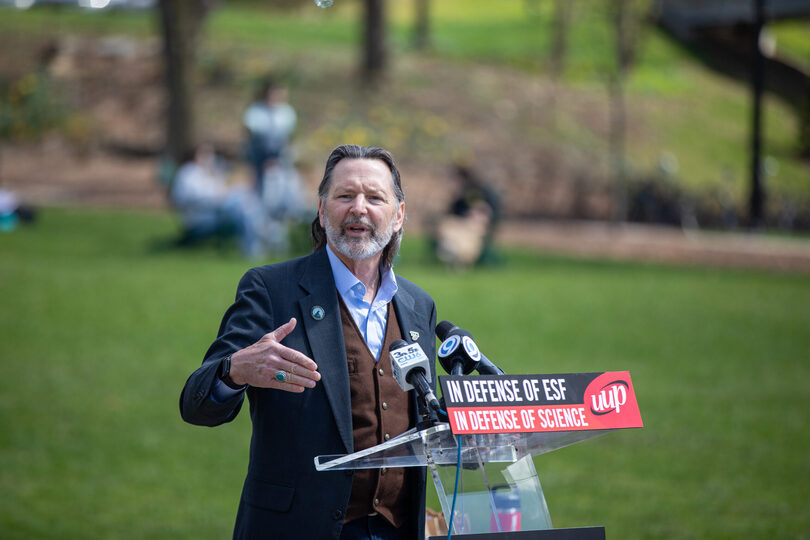Letter to the Editor: Bureaucratic erosion of SUNY ESF squeezes students

The United University President and UUP’s campus chapter president write that despite its distinction among environment-based universities, SUNY ESF’s eroding funding puts the school under siege and call for state action. Leonardo Eriman | Photo Editor
Get the latest Syracuse news delivered right to your inbox.
Subscribe to our newsletter here.
Tucked into the corner of Syracuse University’s campus, the SUNY College of Environmental Science and Forestry is easy to overlook – that is, until you realize it’s one of the only colleges in the country entirely devoted to environmental science and sustainability.
Yet, we are under siege.
Despite its global reputation and local roots, ESF has been subjected to more than a decade of state budget cuts and bureaucratic erosion. What’s happening here should matter to anyone who cares about the environment, public education or the integrity of the Syracuse academic community.
In 2012, SUNY quietly cut about $10 million a year from ESF’s core budget – around a third of its state funding. This cut has never been restored, even as ESF continues to serve students from New York, across the country and around the world. ESF must also pay for a suite of services through Syracuse University, including IT, health services and library access – costs that rise every year without offsetting support from SUNY.
Students feel the squeeze too. Course offerings have been reduced. Faculty positions have gone unfilled. Programs in forestry, chemistry, environmental engineering and landscape architecture have been stretched thinner and thinner. And yet students continue to come because ESF’s mission – and its work – matters.
It also matters to SU.
ESF students are your lab partners, your neighbors, your colleagues in community projects and sustainability initiatives. Faculty from both campuses collaborate on interdisciplinary research. Students share classes, libraries and clubs. A weakened ESF weakens the whole academic community.
Still, SUNY continues to treat ESF as an afterthought. While other campuses received significant stabilization funding in this year’s state budget, ESF – despite being one of the most severely underfunded – got less per student than almost any other campus.
And now the so-called “stability” plan SUNY has imposed is leading to more disruption, not less.
These cuts have already led to the consolidation of our University Police and Dispatch services with SUNY Upstate, the outsourcing of payroll to SUNY Brockport and purchasing to SUNY Oswego.
A voluntary separation plan has been announced with steep, likely unachievable targets. Falling short of those targets will mean faculty layoffs, threats to academic programs and risks to our regional campuses, which are essential to our teaching and research missions. Meanwhile, crucial capital and renovation projects have been delayed.
This is not about belt-tightening. It’s about dismantling the very mission of a college that has prepared environmental leaders for more than a century. It’s about slowly eroding one of New York’s most vital public institutions in the middle of a climate crisis.
If you’re a student here, ask what your tuition is really funding. If you’re a policymaker, ask why a college with national accolades and major research grants is being driven into austerity. If you’re at SU, ask what you lose when your closest public neighbor is pushed toward collapse.
The state and the SUNY chancellor must act. We are calling for the restoration of $10 million in base funding to ESF, the same amount cut in 2012. This is not bailout money. It is the cost of keeping a vital public college alive and functional.
ESF has stood for over a century as a model of science in service to society. Don’t let it be another victim of the state bureaucratic machine. Syracuse deserves better. So does New York. And so does the planet.
This letter was written by United University President Frederick E. Kowal and UUP Environmental Science and Forestry Chapter President Matthew Smith.
Frederick E. Kowal is president of United University Professions. UUP is the nation’s largest higher education union, with more than 42,000 academic and professional faculty and retirees. UUP members work at 29 New York state-operated campuses, including SUNY’s public teaching hospitals and health science centers in Brooklyn, Long Island and Syracuse. It is an affiliate of NYSUT, the American Federation of Teachers, the National Education Association, and the AFL-CIO.






